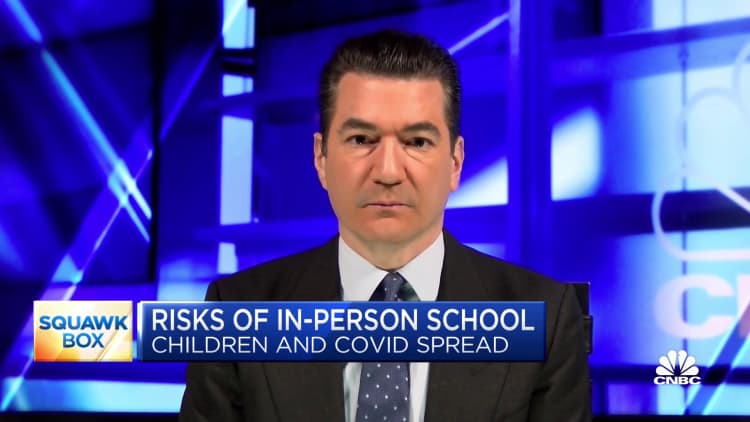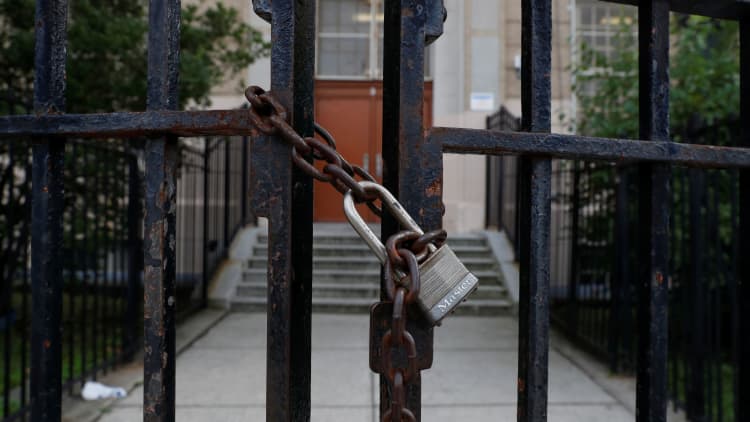
Schools should be the "last thing" shut down as governors and local officials around the U.S. weigh further public health restrictions in response to surging coronavirus cases, Dr. Scott Gottlieb told CNBC on Friday.
"We should be trying to curtail whatever activities we know are sources of community spread long before we close schools," the former Food and Drug Administration commissioner said on "Squawk Box." "So, some of these jurisdictions, including New York City, have it backwards where they close the schools and leave other things open where the spread is occurring."
New York City public schools, the nation's largest education system, switched to fully remote learning on Thursday after the percentage of positive coronavirus tests across the city hit 3% — a metric Democratic Mayor Bill de Blasio had indicated would, at least temporarily, put an end to in-person classes. However, critics lamented that fitness centers and indoor dining at restaurants were still allowed while school buildings had to shutter.
A better public-health approach is to place heavier restrictions on activities that present higher risk for transmission than schools, Gottlieb said. He pointed to the recent set of actions from Democratic Rhode Island Gov. Gina Raimondo, where in-person class from pre-kindergarten to eighth grade will continue. High schools will proceed with limited in-person learning, while gyms, organized sports and "bar areas" will close.
"High schools are a bigger risk. There's more spread in the high schools. They are a source of community spread because the older kids tend to get the virus more readily and they can spread it," said Gottlieb, who led the FDA in the Trump administration for two years. "But we should do everything possible to preserve schools, and especially elementary schools where the educational opportunity of being in the classroom and the socialization is more important."
Schools had become a flashpoint over the summer, with President Donald Trump urging districts to reopen for in-person learning. Some large public districts, such as in San Francisco and Chicago, went entirely remote for the fall. Others, including New York City, employed a hybrid approach that had students in the building only a few days per week. Proponents of in-person learning, even with modifications, stressed the importance for children to be in the classroom, especially compared with online classes.
But as the U.S. coronavirus outbreak intensifies this fall, with hospitalizations and daily new infections at record levels, governors and local officials are faced with the prospect of imposing restrictions to curb transmission and prevent health systems from becoming strained.
In Europe, where various countries have reimposed partial lockdowns to tamp down on surging coronavirus cases, schools were prioritized, Gottlieb noted. Germany and France both shut down bars and restaurants while keeping schools open as they tried to tamp down on Covid-19 spread.
For New York City, in particular, Gottlieb acknowledged there could be risks associated with bringing teachers to schools against the backdrop of rising infections — possibly because they might be more reliant on public transportation. But, Gottlieb stressed, "if they had better control of over their spread and were taking more stringent measures in other venues, they probably could keep the schools open longer. That should be the last thing we close, especially elementary schools."

Disclosure: Scott Gottlieb is a CNBC contributor and is a member of the boards of Pfizer, genetic testing start-up Tempus and biotech company Illumina. Gottlieb also serves as co-chair of Norwegian Cruise Line Holdings′ and Royal Caribbean's "Healthy Sail Panel."


